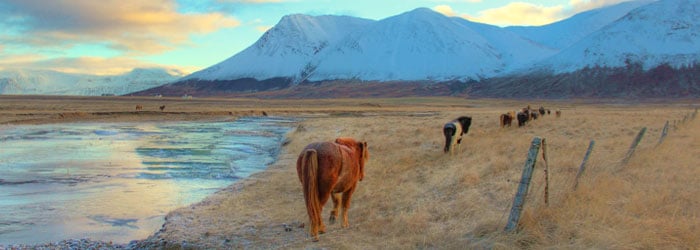The call no one wants: handling medical emergencies in the field
Despite extensive risk management standards, thorough guide training and certification, and far-reaching safety protocols, emergencies in-country, while unfortunate, are unavoidable at times. In this article we’re calling out the difficult topic and addressing the call no one wants to receive: “we have an emergency situation over here.”
Holbrook’s 24-hour response team took such a call recently. The phone rang from Iceland, where Specialty Travel Consultant, Lisa Palmese Graubard, reported an on-site emergency situation. “A participant was taking a gentle Icelandic horseback ride, a highly anticipated activity for the group”, Lisa recalled. “Towards the end of a relaxing and fun ride one of the participants’ horse saw the stable and started galloping faster, which made the gentleman lose his balance and begin to fall to the ground. Unfortunately, he had his foot too far into the stirrup and it got stuck, dragging him along the trail. His foot finally came free and luckily we were near the stable. He had pain in his shoulder and chest area, so we proceeded to call for medical attention.”
The situation thankfully was resolved safely with no serious injury (read the full story below). But it illustrates how travel providers need an emergency response plan in place for field emergencies.
The best preparation is prevention
That old adage “safety first,” although trite is pretty on point. The best way to prepare for an emergency is to prevent one from happening in the first place. Here are a few tips for keeping yourself and your participant’s safe in the field and decreasing the potential for emergent situations:
1. Be informed: educate yourself about the destination prior to departure. Armed with reliable information, you’ll be able to answer questions before they even arise. In addition to your travel provider, two good resources include the US Department of State, which publishes up-to-date, country-specific information and the Centers for Disease Control & Prevention, which outlines the recommended vaccinations and other health precautions relevant to your destination.
2. Know your itinerary: Familiarize yourself not just with the country you’re visiting, but also with your itinerary and the physical requirements of each activity. Before departure, communicate to participants about special circumstances or strenuous activities that may require additional preparation or equipment, like a walking stick or hiking poles, special footwear, or medication to prevent motion sickness.
3. Communicate risks to the group: Many risks can be reduced or eliminated reminding participants of precautions that may seem like common sense. Provide them with accurate information so they can make informed decisions. Also, it’s important to be straightforward and honest about the potential risks of your destination. If a threat exists, acknowledge it without sensationalizing it. By downplaying the potential hazards, you could lose the trust of your travelers, or make it harder for them to properly prepare.
In the event of an emergency – follow the Emergency Response protocol.
We spoke with Etel Castillo, Director of Quality at Holbrook Travel who helped us break down the steps to dealing with an emergency. Holbrook defines an emergency as “any serious incident or situation occurring during a program/trip that significant threatens the group as a whole or is an incident involving one or more participants that may have broader implications.”
As a leader, you will rely on your local guide. All guides are equipped with first aid kit and are CPR certified). Etel provided a breakdown of emergency response in the field when an incident takes place:
1. Guide: Ascertain the nature and level of the emergency
Level 1-2: Minor medical issues (cuts, scrapes), not requiring medical attention.
Level 3: Major medical issues requiring professional medical attention.
2. If Level 1-2: Guide tends to participant, informs the in-country operator and files an incident report.
3. If Level 3: Guide tends to participant as needed and calls for medical assistance. Guide alerts local field staff, then files an incident report.
4. Local Field Staff calls Holbrook Travel directly of the situation, forwards incident report.
5. If Level 3: Holbrook Travel notifies contacts Emergency Contacts of the affected participant(s) and works with the airlines/insurance for medical evacuation if necessary.
6. Guide: debriefs participants and works with leader to ensure the remainder of the group is cared for.
7. In-country field staff: Collaborates with Holbrook Travel and maintains consistent communication until the situation is resolved in entirety.
The Iceland horse riding accident – the rest of the story
Lisa Palmese Graubard continued with the situation in Iceland: “I asked the individuals working at the stable to call an ambulance for him. Once at the hospital, I called the Holbrook Travel emergency line and let them know what happened. The guide and I waited while they took x-rays and found that he broke his collar bone. They put his arm in a sling and recommended he see a specialist at a bigger hospital in Reykjavik to ensure he didn’t need further immediate treatment. The guide stayed at the hospital with them until they got word that the gentleman would not require surgery. The next morning she brought the gentleman and his wife back to re-join the group and we continued on with the itinerary. He wanted to continue. If he would have decided to go home Holbrook Travel would have assisted them in changing their tickets, as well, any other assistance they needed.”
The Resolution: All’s well that ends well
The injured man continued on the trip, even completed all of the hiking activities. The group leaders took special care to keep an eye on him and offer any assistance he might need and the rest of the trip was great. That unfortunate experience did not damper his attitude nor the rest of the group.


